
A cash register, sometimes called a till or automated money handling system, is a mechanical or electronic device for registering and calculating transactions at a point of sale. It is usually attached to a drawer for storing cash and other valuables. A modern cash register is usually attached to a printer that can print out receipts for record-keeping purposes.
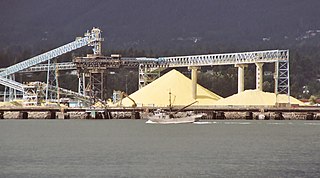
A conveyor belt is the carrying medium of a belt conveyor system. A belt conveyor system is one of many types of conveyor systems. A belt conveyor system consists of two or more pulleys, with a closed loop of carrying medium—the conveyor belt—that rotates about them. One or both of the pulleys are powered, moving the belt and the material on the belt forward. The powered pulley is called the drive pulley while the unpowered pulley is called the idler pulley. There are two main industrial classes of belt conveyors; Those in general material handling such as those moving boxes along inside a factory and bulk material handling such as those used to transport large volumes of resources and agricultural materials, such as grain, salt, coal, ore, sand, overburden and more.
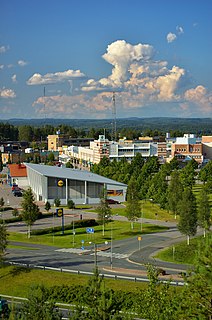
A supermarket is a self-service shop offering a wide variety of food, beverages and household products, organized into sections. This kind of store is larger and has a wider selection than earlier grocery stores, but is smaller and more limited in the range of merchandise than a hypermarket or big-box market. In everyday U.S. usage, however, "grocery store" is synonymous with supermarket, and is not used to refer to other types of stores that sell groceries.
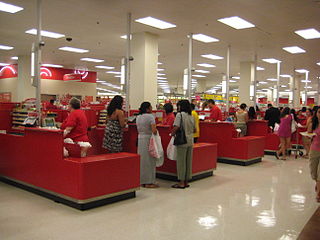
The point of sale (POS) or point of purchase (POP) is the time and place where a retail transaction is completed. At the point of sale, the merchant calculates the amount owed by the customer, indicates that amount, may prepare an invoice for the customer, and indicates the options for the customer to make payment. It is also the point at which a customer makes a payment to the merchant in exchange for goods or after provision of a service. After receiving payment, the merchant may issue a receipt for the transaction, which is usually printed but can also be dispensed with or sent electronically.
PAK'nSAVE is a New Zealand discount food warehouse chain owned by the Foodstuffs cooperative. It is one of the three main supermarket chains, alongside Countdown and New World.

An aisle is, in general, a space for walking with rows of non-walking spaces on both sides. Aisles with seating on both sides can be seen in airplanes, certain types of buildings, such as churches, cathedrals, synagogues, meeting halls, parliaments and legislatures, courtrooms, theatres, and in certain types of passenger vehicles. Their floors may be flat or, as in theatres, stepped upwards from a stage.
Atlantic Superstore is a Canadian supermarket chain. The chain operates 54 stores in the Maritimes of Nova Scotia, New Brunswick, and Prince Edward Island. It is owned by George Weston Limited through Loblaw Companies Limited, and operates under the Atlantic Wholesalers division of Loblaws.

Conveyor belt sushi, also called rotation sushi, is a type of sushi restaurant common in Japan. In Australasia, it is also known as a sushi train.

Supermarket Sweep is an American television game show. The format combines an ordinary team-based quiz show with the novel concept of a live, timed race through a supermarket. In the timed race, cameras follow the teams with shopping carts through a large vacated supermarket with several aisles; the value of items thrown into the cart determine the winning team. The original show was broadcast on ABC from December 20, 1965, to July 14, 1967. Later seasons aired on Lifetime from February 5, 1990, to June 16, 1995, and later from April 3, 2000, to May 23, 2003, with reruns airing until March 26, 2004. Another version of the show premiered on October 18, 2020, also on ABC.

Piggly Wiggly is an American supermarket chain operating in the American Southern and Midwestern regions run by Piggly Wiggly, LLC, an affiliate of C&S Wholesale Grocers. Its first outlet opened in 1916 in Memphis, Tennessee, and is notable for having been the first true self-service grocery store, and the originator of various familiar supermarket features such as checkout stands, individual item price marking and shopping carts. The current company headquarters is in Keene, New Hampshire. A total of 499 independently owned Piggly Wiggly stores currently operate across 18 states, primarily in smaller cities and towns.
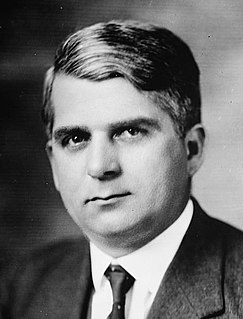
Clarence Saunders was an American grocer who first developed the modern retail sales model of self service. His ideas have had a massive influence on the development of the modern supermarket. Saunders worked for most of his life trying to develop a truly automated store, developing Piggly Wiggly, Keedoozle, and Foodelectric store concepts.

Trollie Wallie is a platform game for the Commodore 64 written by Andrew Challis and published in 1984 by Interceptor Micros. An Amstrad CPC port was released in 1986. Trollie Wallie is a sequel to Wheelin' Wallie from the same year.
No Frills is a Canadian chain of discount supermarkets, owned by Loblaw Companies Limited, a subsidiary of George Weston Limited. There are over 200 franchise stores located in nine Canadian provinces.
Service Merchandise was a retail chain of catalog showrooms carrying jewelry, toys, sporting goods, and electronics. The company, which first began in 1934 as a five-and-dime store, was in existence for 68 years before ceasing operations in 2002.

Finast was a retail supermarket brand that started in the northeastern United States, with headquarters in Somerville, Massachusetts. Finast was an acronym for FIrst NAtional STores. Commonly referred to as "The First National", the stores operated under the First National name for decades, while the Finast acronym was reserved for its store-brand products. Several years later, most of its stores were renamed Finast during a modernization effort.

Self-checkouts (SCOs), also known as assisted checkouts (ACOs) or self-service checkouts, are machines that provide a mechanism for customers to complete their own transaction from a retailer without needing a traditional staffed checkout. When using SCOs, customers scan item barcodes before paying for their total shop without needing one-to-one staff assistance. Self-checkouts are used mainly in supermarkets, although they aren't uncommon in department or convenience stores. Most self-checkout areas are supervised by at least one staff member, often assisting customers process transactions, correcting prices, or otherwise providing service.
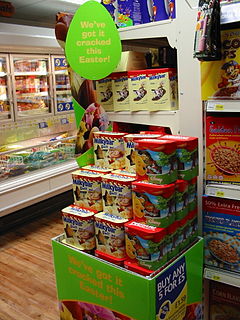
A point-of-sale display is a specialised form of sales promotion that is found near, on, or next to a checkout counter. They are intended to draw the customers' attention to products, which may be new products, or on special offer, and are also used to promote special events, e.g. seasonal or holiday-time sales. POS displays can include free standing display units (FSDU), shelf edging, dummy packs, strut cards, standees, hanging signs, counter display units (CDU), display packs, endcaps, display stands, mobiles, posters, and banners.

Keedoozle was the first fully automated grocery store in the United States, a vending machine concept developed by grocer Clarence Saunders in 1937. It is often held that the name "Keedoozle" was coined by Saunders to refer to the technology used, in which a "Key Does All" for the grocery shopper, but another interview with Saunders appears to contradict this.
Amazon Fresh is a subsidiary of the American e-commerce company Amazon in Seattle, Washington. It is a grocery retailer with physical stores and delivery services in most major U.S. cities, as well as some international cities, such as Berlin, Hamburg, London, Milan, Munich, Rome, Tokyo, and some other locations in Singapore and India. In 2020, Amazon Fresh opened several physical stores in the United States and the United Kingdom. The first store opened in the Los Angeles area, followed by the Chicago, Philadelphia, Seattle, Washington, D.C., and other areas.

Amazon Go is a chain of convenience stores in the United States and the United Kingdom, operated by the online retailer Amazon. The stores are cashierless, thus partially automated, with customers able to purchase products without being checked out by a cashier or using a self-checkout station. As of 2020, there are 29 open and announced store locations in Seattle, Chicago, San Francisco, London and New York City.















